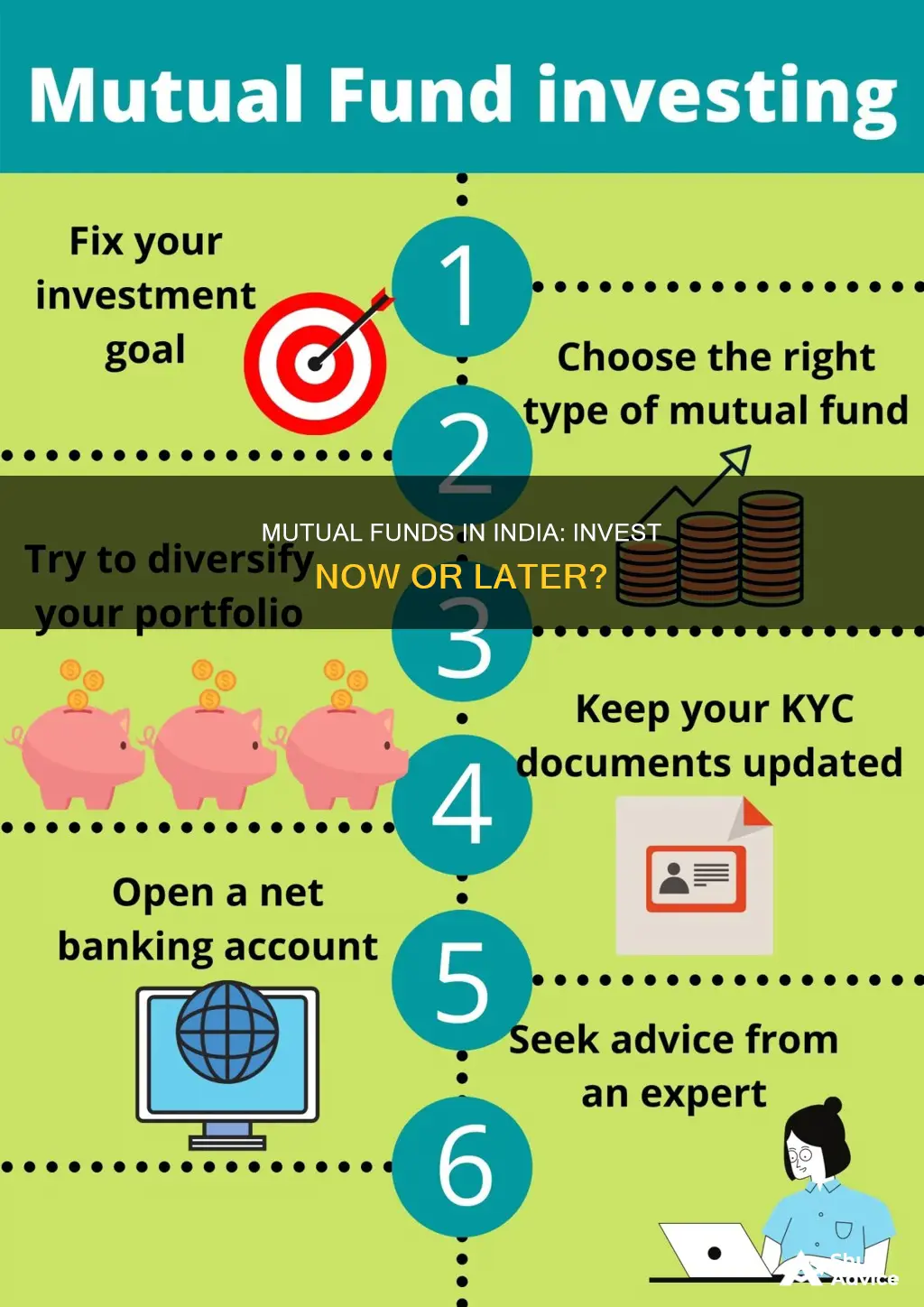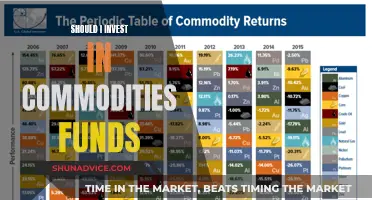
Investing in mutual funds is a great way to quickly and easily invest in the stock market without having to worry about diversifying your investments. However, it is important to remember that investing in mutual funds carries the risk of losing some or all of the money invested.
The timing of your investment plays a significant role in mutual fund investments, especially in equity funds or funds with considerable equity exposure. The returns from such funds are directly linked to the equity markets, which demands an ideal entry and exit point to earn good returns. As a result, if the markets are hitting new highs, the Net Asset Value (NAVs) of these funds would be higher.
However, it is almost impossible for inexperienced investors to identify the lows and highs of the market accurately, and even professional fund managers find it challenging. Therefore, sticking to the predetermined investment strategy is key to successful timing and good returns in mutual funds.
There is no rule of thumb or fixed criteria to state the best time for investing in mutual funds. While a bear market may look like an ideal time to invest, identifying a bear market depends entirely on the expertise of the fund manager. For investors, the best approach is to divide the investment amount into equal parts and then invest in the fund of your choice at fixed intervals. This eliminates the need to time the market or think about the tops and bottoms.
With Systematic Investment Plans (SIPs), you can select a fixed amount to invest in the fund of your choice at regular intervals such as monthly, quarterly, biannual, or annual. Most schemes allow you to get started with as little as Rs. 500 per month. SIPs can help you significantly lower the overall risk and average out losses in the long term, while also improving profit potential over time.
So, is it the right time to invest in mutual funds? Definitely yes. The markets have fallen considerably, causing the NAVs of mutual fund schemes to drop. By investing now, you could generate handsome returns when the markets start rising again. However, it is almost impossible to say that the markets won't fall any further.
If you are concerned about timing your investment, the best approach is to divide your investment amount into equal parts and invest at regular intervals. Alternatively, you can skip this process and start a SIP in a mutual fund of your choice. However, before investing, it is wise to consider your investment objective, risk appetite, and investment horizon.
| Characteristics | Values |
|---|---|
| Best time to invest in mutual funds | There is no best time as such for investing in mutual funds. Individuals can make investments in mutual funds as and when they wish. However, it is always better to catch the funds at a lower NAV rather than a higher price. |
| When not to invest in mutual funds | At the height of a bull market, many people invest in mutual funds but risk having to liquidate their holdings at a loss when the market begins to decline. |
| Mutual funds vs individual stocks/bonds | Mutual funds are a relatively safe investment option. They are usually managed by experienced professionals, provide diversification, are regulated by SEBI, are transparent, cost-effective, and have high liquidity. |
| Who should invest in mutual funds | Mutual funds are a great way to invest for individuals who can do with professional help in the management of funds in varied asset classes or sectors. |
What You'll Learn

The benefits of investing early
Investing in mutual funds in India can be a powerful tool for wealth creation, especially with the country's growing economy and burgeoning middle class. Here are the key benefits of investing in mutual funds early:
Compounding Effects
The power of compounding refers to earning returns not just on your initial investment but also on the returns generated over time. The longer your money remains invested in mutual funds, the greater the compounding effect. Starting early allows more time for your money to grow exponentially, leading to substantial wealth accumulation in the long run.
Mitigating Market Fluctuations
Early investments in mutual funds help smooth out market fluctuations. By staying invested for a longer duration, you can ride out market volatility and benefit from rupee cost averaging. This strategy involves buying more units when prices are low and fewer units when prices are high, resulting in a more balanced and stable investment journey.
Long-Term Growth
Starting your investment journey early gives your investments a longer horizon to grow. Even with the same rate of returns, an investor who starts early will accumulate a larger corpus over time. This is because delays in investing reduce the power of compounding as the investment term decreases.
Risk Diversification
Mutual funds provide an easy way to diversify your investments across many securities and asset categories, such as equity, debt, and gold. This diversification helps to spread the risk so that you don't have all your eggs in one basket. Even if one investment in the portfolio decreases in value, other investments may not be impacted and can even increase in value.
Professional Management
Mutual funds are managed by full-time, professional money managers who have the expertise, experience, and resources to actively buy, sell, and monitor investments. They continuously monitor investments and rebalance the portfolio to meet the fund's objectives. This professional management ensures that your investments are in capable hands.
In conclusion, the benefits of investing early in mutual funds include the power of compounding, mitigating market fluctuations, long-term growth potential, risk diversification, and professional management of your investments. The key takeaway is to start investing as soon as possible, harness the power of compounding, and focus on "time in the market" rather than "timing the market."
A Safe Mutual Fund Investment: Strategies for Beginners
You may want to see also

The importance of a diversified portfolio
Investing in mutual funds is a powerful tool for wealth creation, especially in a country like India with a growing economy and burgeoning middle class. However, the question of when to start investing in mutual funds is one that many individuals grapple with. The simple answer is the sooner, the better.
But what about creating a diversified portfolio? Is it important, and if so, why?
Diversification is a management strategy that blends different investments in a single portfolio. The idea is that a variety of investments will yield higher returns and lower the risk for investors. Diversification is about not putting all your eggs in one basket.
- Reducing Risk: Diversification helps to reduce the overall risk of your portfolio. If one stock, sector, or asset class slumps, a well-diversified portfolio means that other investments may rise, counteracting the loss. This is especially true if the securities or assets are not closely correlated.
- Mitigating Volatility: Diversification helps to reduce the volatility of your portfolio over time. By spreading your investments across several asset classes, you can lower the impact of market volatility and reduce the number and severity of ups and downs.
- Long-Term Growth: While diversification may not ensure a profit or guarantee against loss, it can help you achieve long-term growth by balancing your comfort level with risk against your time horizon. A diversified portfolio can provide the opportunity for higher growth over the long term, especially for younger investors.
- Customisation: A diversified portfolio can be customised based on your risk appetite, investment goals, and life stage. For example, young professionals can start with equity-oriented funds, while middle-aged investors can balance growth and stability with a mix of equity, debt, and hybrid funds.
- Flexibility: Diversification allows you to invest in a range of asset classes, including stocks, bonds, mutual funds, exchange-traded funds (ETFs), real estate investment trusts (REITs), and more. You can also invest globally, spreading your risk and potentially leading to bigger rewards.
In conclusion, a diversified portfolio is a crucial component of a smart investment strategy. It helps to balance risk and reward, reduce volatility, and achieve long-term growth. By diversifying your mutual fund investments, you can make more informed and disciplined investment choices, leading to greater financial stability and success.
Unit Trust Funds: Diversify Your Portfolio, Maximize Returns
You may want to see also

How to choose the right asset
When it comes to investing in mutual funds, there is no one-size-fits-all approach, and choosing the right asset is crucial. Here are some key considerations to help you make informed decisions about your investments:
Investment Horizon
The time you have to achieve your financial goals is an important factor in choosing the right asset. Equity funds are typically better suited for long-term goals, while debt funds are more appropriate for short to medium-term objectives. For very short investment periods (less than a year), consider funds like overnight funds, liquid funds, or ultra-short-duration funds.
Investment Objective
Understanding your investment objective is essential. If you seek capital appreciation over the long term, equity funds are a good option. On the other hand, if you prefer regular income, debt funds may be more suitable.
Risk Profile
Different assets carry different levels of risk. Equity funds, for instance, generally have higher risk and higher returns potential than debt funds. Assess your risk tolerance based on factors like age, life stage, and financial situation. If you have a moderately high to high-risk appetite, equity funds may be a good choice. On the other hand, if you're more conservative, debt funds or bond funds might be a better fit.
Taxation
Tax implications can significantly impact your investment returns. Understand the tax consequences of your investments before committing. For example, short-term capital gains (held for less than a year) in equity funds are typically taxed at a higher rate than long-term capital gains.
Lump Sum or Systematic Investment Plan (SIP)
Decide whether you want to invest a lump sum or through SIPs. SIPs offer the benefit of rupee-cost averaging and the power of compounding. If you have a substantial amount to invest, consider a lump sum investment, allocating your funds according to your optimal asset allocation strategy.
Fund Manager and Fund House Track Record
Consider the long-term performance of the fund, its fund manager, and the fund house. A strong, stable, and experienced fund management team with a proven track record can inspire more confidence in prospective investors.
Expense Ratio
The expense ratio represents the fees charged by investors for managing your investments. While it may seem insignificant, it can have a substantial impact on your total investment portfolio. Aim for mutual funds with lower expense ratios to maximise your net returns.
In summary, choosing the right asset for your mutual fund investments requires careful consideration of your financial goals, risk tolerance, investment horizon, and tax implications. Remember to seek advice from a financial advisor if you need help understanding the investment characteristics of different mutual funds.
You Invest: Exploring Mutual Fund Options
You may want to see also

The role of fund managers
Fund managers are investment experts responsible for managing mutual funds, hedge funds, pension funds, and portfolio-management services on behalf of investors. They are responsible for making investment decisions and accomplishing the fund's investment objectives.
Selection of Securities
One of the critical roles of a fund manager is to decide which securities to include in the portfolio. They conduct extensive research to make these decisions and may also need to replace securities in their portfolios with better ones, determining when to sell.
Risk Management
Fund managers are in charge of managing portfolio risk. They ensure that the overall risk in the portfolio aligns with the fund's objectives and mandate. They employ risk management techniques to evaluate investments and ensure that there is adequate diversification in asset portfolios.
Tracking Performance
Fund managers regularly track the performance of their funds and may decide to exit underperforming securities. Their goal is to generate better returns than the benchmark and their peers.
Compliance with Regulations
Fund managers must ensure compliance with regulations set by governing bodies like the Securities Exchange Board of India (SEBI). They are responsible for ensuring that investors are aware of and abide by the rules and that all documents are furnished on time, following the laws and regulations.
Protection of Wealth
Fund managers have a duty to protect the wealth of investors. While funds are subject to some risks to generate returns, fund managers must not assume reckless risks. Their decisions to buy or sell assets are based on extensive research and due diligence, and they may employ investigations and risk management techniques to protect investors' wealth.
Monitoring Fund Growth and Performance
Fund managers decide where to invest, taking into account regulations, investor expectations, and objectives. They are judged based on how well their funds perform and their ability to deliver growth above interest rates and the inflation rate, justifying the risks they take.
Oversight and Hiring
Given the extensive responsibilities of managing funds, fund managers often outsource specific duties to third-party professionals and firms. For example, tasks like issuing annual reports, getting capital, and negotiating with brokers may be outsourced. However, the fund manager remains solely responsible for the overall performance of the funds.
Evaluating a Fund Manager
When evaluating a fund manager, investors should consider factors such as experience, past performance, investment style, tenure with the fund, and stability. Experienced fund managers with a track record of outperforming benchmarks are generally preferred.
SoftBank Vision Fund: A Guide to Investing in Innovation
You may want to see also

The risks of investing in mutual funds
Investing in mutual funds is a powerful tool for wealth creation, especially in a country like India with its growing economy and burgeoning middle class. However, it is important to remember that all investments carry some degree of risk. While mutual funds offer benefits such as value-for-money and diversification, there are several associated risks that investors should be aware of. Here are some of the key risks of investing in mutual funds:
Systematic Risk
Systematic risk, also known as market risk, is the possibility of losses due to the poor performance of the market as a whole. This type of risk is inherent in all investments and is not specific to mutual funds. Factors such as natural disasters, inflation, recession, political unrest, and fluctuations in interest rates can influence market performance and lead to potential losses for investors. Diversification of an investment portfolio may not always protect against systematic risk.
Unsystematic Risk
Unsystematic risk refers to the risk associated with investing in a specific company, industry, or sector. It is important to diversify your investments across different sectors and asset classes to mitigate this risk. Concentrating a significant portion of your investment in one particular scheme or sector increases the potential for substantial losses if that specific area experiences negative market situations.
Interest Rate Risk
Interest rate risk arises from changes in interest rates during the investment period, which can result in a reduction in the price of securities. For example, if you invest at a fixed interest rate and the market interest rate increases, the value of your investment may decrease. Conversely, if the market interest rate decreases, you may be unable to sell your investment without taking a loss.
Liquidity Risk
Liquidity risk refers to the difficulty of redeeming an investment without incurring a loss. Mutual funds with long-term and rigid lock-in periods, such as ELSS, often carry liquidity risk. Additionally, exchange-traded funds (ETFs) may suffer from liquidity risk if there is a lack of buyers in the market, making it challenging to redeem your investments when needed.
Credit Risk
Credit risk is the possibility that the issuer of a mutual fund scheme will be unable to pay the promised interest or principal amount. This risk is particularly relevant to debt funds, where fund managers may include lower credit-rated securities to enhance returns. Before investing in debt funds, it is crucial to examine the credit ratings of the securities included in the portfolio.
Inflation Risk
Inflation risk is the potential loss of purchasing power due to rising inflation. If the returns on your investments do not keep up with the rate of inflation, your real returns will be lower than expected. For example, if you earn a 5% return on your investment while inflation is 3%, your actual returns amount to only 2%.
Other Risks
Other risks associated with mutual funds include concentration risk, where investing heavily in one sector or company can lead to significant losses, and currency risk, where a decrease in the exchange rate can reduce the value of foreign currency-denominated funds.
While these risks are inherent in mutual fund investing, they can be mitigated through careful planning and smart investment strategies. Diversification, matching your investment profile to your risk appetite, and investing through Systematic Investment Plans (SIPs) are some ways to reduce the impact of these risks.
Hedge Funds vs Investment Banking: Choosing Your Financial Career
You may want to see also







